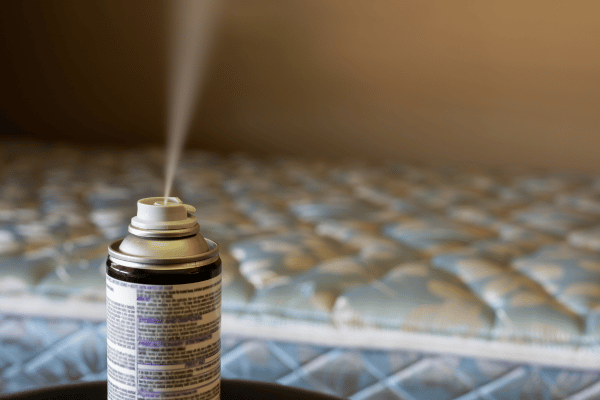- Home
- Trapping Rats
- What Do Rats Eat
What Do Rats Eat
This post may contain affiliate links so I earn a commission.
What do rats eat when they enter your home in search of food?
Unfortunately, they eat just about anything they can find.
Rats have adapted to live in various environments all over the world offering them a plethora of different food sources, giving them possibly the most varied diet of all animals.
However, different species of rats prefer different types of food.
For example, some are herbivorous, some frugivorous (fruit eating), and others are exclusively carnivorous.
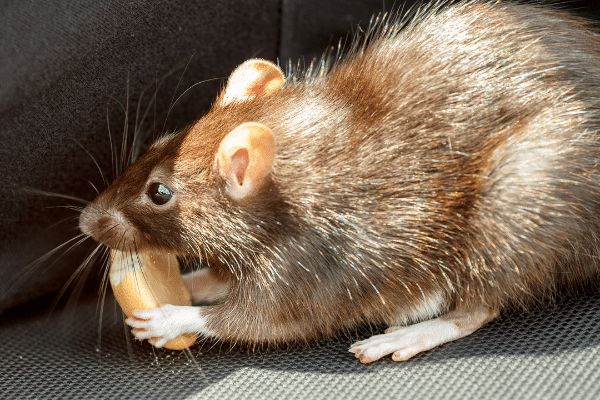
Rats don't only consume food as they find it, like other rodents, they take some of the food away and store it near their homes for future use.
To learn more about protecting your home from an unwanted infestation, lets look at a wild rats diet a little closer and learn some important preventative measures.
What Do Rats Eat In The Wild
Most wild American rats are opportunistic omnivorous feeders and, as you may be aware, will eat whatever is available to them.
They basically eat anything a human eats and more.
All rats eat grains, and some will also eat meat and fish.
Others enjoy fruit, vegetables, nuts, seeds, eggs, milk, and candy.
Wild rats also eat bugs, insects, leather, fur and other rodents and small animals.
While they will mostly eat what they can find, they can occasionally hunt as well.
What do rats eat in urban areas?
Rats that live in cities will eat whatever they can get access to in garbage cans, landfills, bird feeders, pet food (think dogs, cats, rabbits and chickens).
They can also be found near livestock feed stores, garages, cellar doors, fruit or nut trees, dumpsters, compost bins, or anywhere food or food waste is stored.
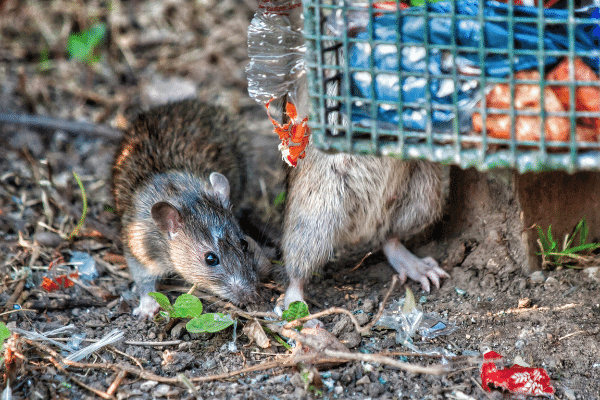
Rats may only be small but they eat constantly.
The glutinous little rodents can consume up to 1/3 of their body weight each day.
Think Templeton from Charlotte's Web or from Emile from Disney Pixar's Ratatouille, both characters are quite accurately depicted eating at every opportunity!
Where rats are provided with a choice of different foods, they will try at least a small sample of each.
Though they do eat A LOT, rats are generally weary of new foods.
If they do try a new food, they will usually only sample a small amount to begin with, to be sure it is safe and digestible.
They uphold the general principle of eating what others eat, though this doesn't actually help them to identity poisons, as they still prefer the foods they smell on other's breaths, assuming that it is safe, not knowing whether or not that rat may be sick or dying.
Trapping, if necessary, can therefore be more effective if the trap is initially baited but not set.
This introduces the bait in an inviting, gradual manner allowing the rats to think it's safe.
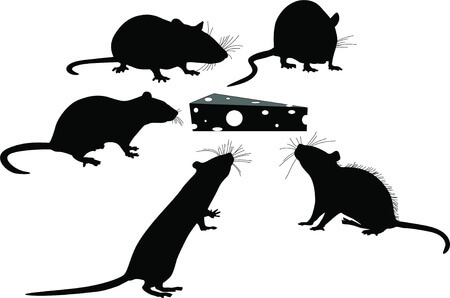
While our home has been invaded once or twice (just after we got chickens and kept our scrap bucket under the kitchen sink) we undertook what felt like an impossible task to rid our home of the pests without using poison.
At one point I debated whether it was necessary or if we could just coexist, until they kept us awake scampering around in the roof, chewing through power cords, carpets, cupboards, and finally raiding our pantry.
In the end, several well placed traps and some prevention techniques took care of the problem.
What Do Rats Eat - Disease Control
Rats and mice are not only an inconvenience in your home, they are notorious for carrying disease and causing damage.
They also contaminate the food they come in contact with as they leave their urine and feces wherever they've been.
Their fur and excrement is a particular problem in spreading disease.
It is estimated that they contaminate 20% of the world's agricultural produce.
A sign that you have an infestation are droppings and gnawed holes in baseboards or door frames.
You may also hear them moving around in the walls and roof spaces.
The family cat or dog waiting near a cupboard or staring at a wall can be another indicator.
Since rats are nocturnal, they usually feed and forage for food at night, in order to stay hidden and to avoid predators.
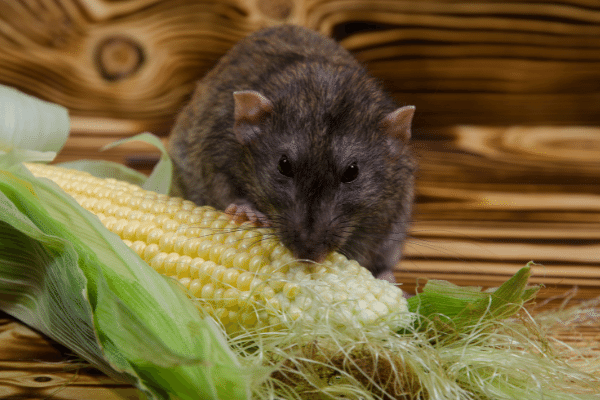
If you actually see one in your home, chances are you have more than just one or two unwanted visitors.
The key to prevent them from entering your home (and keeping them out of your yard and outbuildings) is to limit their access to food and water by proper food storage and eliminating access points.
Rats can eat right through plastic bags and cardboard boxes.
They can even chew straight through wood and plastic pipes and can enter through 1/4 inch holes.
It can be a challenge to keep all food sources inaccessible, but it's a worthwhile task to keep them from taking over.
It is best to store entire bags of feed in metal containers or garbage tins with tight fitting lids.
Keep food stored in airtight containers that cannot readily be gnawed through.
You can even keep fruit and nuts in the refrigerator, keeping them fresh while inaccessible.
Keep food out only while you are eating or using it and avoid leaving dirty dishes around.
Keep food scraps in a sealed container.
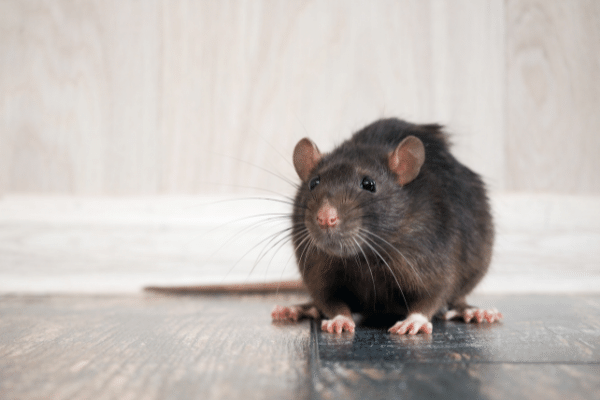
Feed pets indoors where possible and pick up or clean dishes when finished with.
Bird feeders for wild birds are not necessary for their survival unless in circumstances of extreme weather where they are unable to forage for themselves.
These less obvious food sources can draw rats to your home.
If you are having issues with rats be extra vigilant, practice basic hygiene and avoid leaving excess food out for your pets and livestock.
What Do Rats Eat - Trapping
There are various traps available on today's market to help you get rid of rats, however prevention is always better than a cure.
Some additional precautions you can take to protect your home and property from rats are:
- Keep stacks of firewood (which contains bugs and insects) away from your home and keep them dry and tightly stacked.
- Keep bushes and plants free from weeds and 18 inches or more from your home, providing a clearing between the plants and your home.
- Seal interior or exterior holes 1/4 inch or larger, as well as gaps around plumbing, windows or doors and any cracks in the walls or floors.
While there are many various species of rats worldwide, in North America the Norway rat and the roof rat are the most common.

In order to trap them, it is useful to know which species you are dealing with.
Norway rats, typically found at ground level, prefer fatty foods or foods high in protein or sugar.
Roof rats on the other hand, favor plant based foods like nuts and fruit.
If you are unsure of which you have, peanut butter or dried fruit can be used as bait, as they appeal to both species.
What Do Rats Eat - Overall
Although rats can be a huge problem if they're ignored, you don't have to let them control your home and your lifestyle.
Seal off entry points, remove easy food sources and set several well placed traps and before you know it your rat problem will be under control.
Then, when you ask the question "What do rats eat?"
Your response can be "Nothing in my house!"

